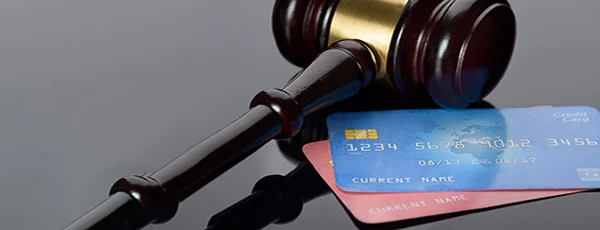Credit Card Debt Lawyer: Should You Use One?

UpdatedJun 20, 2025
- Credit card companies can sue you if you don’t pay your debt.
- Ignoring a summons is the worst move—you lose your case automatically.
- A credit card debt lawyer can represent you in court, negotiate settlements, or help you file for bankruptcy protection.
Table of Contents
- What Is a Credit Card Debt Lawyer?
- Why Should You Use a Credit Card Debt Lawyer If Sued By a Credit Card Company or a Debt Buyer?
- How Can a Credit Card Debt Lawyer Help When You Receive a Summons to Court?
- When Should You Consider Hiring an Attorney?
- What Is the Procedure When Dealing With a Debt Lawyer?
- What Happens Once You Get a Lawyer for Credit Card Debt?
- How Much Does It Cost to Hire a Credit Card Debt Lawyer?
- How Do You Find Credit Card Debt Lawyers?
- Alternatives to Hiring a Lawyer For Debt
If you’re sued for credit card debt and lose, creditors can inflict damage. They might garnish your wages, take money from your bank account, or even make you pay their legal fees. When you're facing such high stakes, a credit card debt lawyer can be key to a better outcome.
What Is a Credit Card Debt Lawyer?
A credit card debt lawyer specializes in laws governing debt collection. If you’ve borrowed money you can’t repay, a credit card debt lawyer could negotiate with creditors, defend you in debt-related lawsuits, or file bankruptcy on your behalf. They grind away so you don’t have to.
On the flip side, you could also hire a debt lawyer to file a lawsuit against someone you’ve loaned money to, helping you collect on your loan. It’s an aggressive solution to a sticky problem.
A debt lawyer can save you the hassle of going to court by helping you through debt settlement, the process of settling a debt for less than you owe.
Why Should You Use a Credit Card Debt Lawyer If Sued By a Credit Card Company or a Debt Buyer?
Hiring a credit card debt lawyer can offer peace of mind and potentially save you money in the long run if you can afford their services on the front end. Doing nothing when sued for credit card debt is the worst choice—yet over 70% of people take that route.
Pew Research shows that while nearly all lenders hire lawyers for debt collection, fewer than 10% of defendants do. Those who hire a credit card debt lawyer are “more likely to win their case outright, or reach a mutually agreed settlement,” according to Pew.
How Can a Credit Card Debt Lawyer Help When You Receive a Summons to Court?
Credit card debt lawyers bring expertise and experience to the room.
Here’s what credit card debt lawyers do:
Leverage legal knowledge: Understand and enforce laws creditors must follow, protecting you from intimidation or illegal tactics.
Handle paperwork: Manage legal documents and deadlines to avoid costly errors.
Negotiate: Secure debt relief or affordable payment plans if you owe but can’t pay in full.
Represent you: Defend you in court or guide you through bankruptcy.
When Should You Consider Hiring an Attorney?
Not every debt situation demands a credit card debt lawyer. If it’s more expensive to hire a lawyer than to pay your debt, go with the cheaper option. If your creditor files a lawsuit because they can’t reach you by phone or mail, you may be able to sort things out with a simple phone call.
That said, a credit card debt lawyer can be super important in complicated or high-stakes cases, such as when:
You dispute the debt amount or the creditor’s right to sue (maybe you believe the statute of limitations on credit card debt has expired).
You’re unsure how to communicate with creditors or debt collectors, and you’re worried about making things worse.
You can’t go to court and need representation.
You’re facing harassment or suspect debt collectors are breaking the law (many do).
You want help with debt resolution (negotiating a payment plan or getting your creditor to accept a lower amount instead).
You’re exploring bankruptcy.
Aggressive creditors and debt buyers sometimes bank on your fear, suing for debts they can’t legally collect. A good credit card debt lawyer can recognize this and send them packing.
What Is the Procedure When Dealing With a Debt Lawyer?
Most credit card debt lawyers offer a free initial consultation to review your case and estimate costs for handling a lawsuit, settlement, or bankruptcy.
When a creditor sues, you must file a formal legal response called an Answer. Your credit card debt lawyer pinpoints defenses or counterclaims, then files the Answer for you, stating whether you owe the debt, listing defenses, and so on. They may negotiate a settlement to avoid court, represent you if it proceeds, or recommend bankruptcy if it’s your best option.
What Happens Once You Get a Lawyer for Credit Card Debt?
You and your lawyer go over your situation, including the debts you owe. You develop a strategy to handle debts, and your lawyer moves the strategy forward. They may handle the important details like negotiating with creditors or filing paperwork.
| Step | Description |
|---|---|
| Consult lawyer | Meet with the lawyer, provide documents, and discuss your situation. |
| Evaluate case | Lawyer reviews case to assess debt validity and legal options. |
| Develop strategy | Decide on actions like responding to lawsuits, negotiating, or filing for bankruptcy. |
| Follow strategy | Lawyer executes strategy, such as by filing responses or negotiating settlements. |
| Communicate | Lawyer keeps you updated on progress and next steps. |
| Resolve | Case resolved through settlement, court decision, or otherwise. |
For your initial consultation, bring copies of your debt records and your records of communication with the debt collector. This helps you and your lawyer create next steps.
Once you lawyer up, let debt collectors know the name of the attorney representing you and how to contact them. Federal law requires debt collectors to go through your attorney when they know you have one. Debt collectors can only contact you directly when your lawyer fails to respond within a reasonable timeframe.
How Much Does It Cost to Hire a Credit Card Debt Lawyer?
Lawyers often charge $500 or more to handle a simple credit card debt. It varies. Lawyers charge more for complicated cases, sometimes many times more. Your lawyer might charge hourly for negotiating with creditors, or charge you a percentage based on your debt size or on how much your lawyer saves you during settlement. Clarify fees during your free consultation.
How Do You Find Credit Card Debt Lawyers?
Look for a lawyer experienced in consumer law or debt collection defense. Here are a few ways to find one:
Contact a lawyer referral service via the American Bar Association or your state bar.
Check state legal aid programs if you’re low-income.
If you’re a military service member, consult your local JAG office.
Ask trusted contacts for attorney recommendations.
Get a referral from an attorney you already know.
Contact attorneys you find online after you check their reputation through review sites and you verify that they are licensed to practice.
How to check if they’re legitimate: Search your lawyer’s name on the state bar website or call the state bar organization to find out if your lawyer is in good standing.
Alternatives to Hiring a Lawyer For Debt
If hiring an attorney isn’t something you can easily do, consider these alternatives.
Low-cost legal help: You can apply for low-cost or free help from a legal aid program for people with lower incomes. Local courts, libraries, and community centers can sometimes point you in the right direction.
Limited advice: You can book an hour or two with an attorney for advice. It’s much cheaper than full representation, and most lawyers offer a free consultation. That might be all you need to determine how strong your case is and what to do next.
Self-representation: Attorneys and judges are used to amateurs in small claims court, which is where you might end up if your debt is small. You may want to represent yourself if you’re comfortable filling out forms and speaking in front of people.
Debt settlement programs: You can hire a professional debt settlement company to negotiate with creditors on your behalf. While this proceeds, you can file an Answer with the court to show the creditor you’re not giving up, and to buy yourself time to settle.
Debt relief by the numbers
We looked at a sample of data from Freedom Debt Relief of people seeking credit card debt relief during May 2025. This data reveals the diversity of individuals seeking help and provides insights into some of their key characteristics.
Age distribution of debt relief seekers
Debt affects people of all ages, but some age groups are more likely to seek help than others. In May 2025, the average age of people seeking debt relief was 53. The data showed that 24% were over 65, and 14% were between 26-35. Financial hardships can affect anyone, no matter their age, and you can never be too young or too old to seek help.
Student loan debt – average debt by selected states.
According to the 2023 Federal Reserve Survey of Consumer Finances (SCF) the average student debt for those with a balance was $46,980. The percentage of families with student debt was 22%. (Note: It used 2022 data).
Student loan debt among those seeking debt relief is prevalent. In May 2025, 27% of the debt relief seekers had student debt. The average student debt balance (for those with student debt) was $48,703.
Here is a quick look at the top five states by average student debt balance.
| State | Percent with student loans | Average Balance for those with student loans | Average monthly payment |
|---|---|---|---|
| District of Columbia | 34 | $71,987 | $203 |
| Georgia | 29 | $59,907 | $183 |
| Mississippi | 28 | $55,347 | $145 |
| Alaska | 22 | $54,555 | $104 |
| Maryland | 31 | $54,495 | $142 |
The statistics are based on all debt relief seekers with a student loan balance over $0.
Student debt is an important part of many households' financial picture. When you examine your finances, consider your total debt and your monthly payments.
Manage Your Finances Better
Understanding your debt situation is crucial. It could be high credit use, many tradelines, or a low FICO score. The right debt relief can help you manage your money. Begin your journey to financial stability by taking the first step.
Show source
Author Information

Written by
Cole Tretheway
Cole is a freelance writer. He’s written hundreds of useful articles on money for personal finance publications like The Motley Fool Money. He breaks down complicated topics, like how credit cards work and which brokerage apps are the best, so that they’re easy to understand.
What is the difference between an original creditor and a credit card debt buyer?
The original creditor is the individual or company you borrow money from—for instance, your bank or credit card company. Original creditors typically try to contact you for several months once you start missing payments. If unsuccessful, they may take you to court, send your account to a collection agency, or sell your account at a discount to a debt buyer.
Debt buyers purchase past-due accounts and get to keep whatever they can collect from you.
Collection agencies can be hired to collect past due accounts for original creditors, or they may function as debt buyers.
What kind of fees can a credit card debt lawyer take?
Lawyers can structure their fees in several ways: flat fee, hourly, on a contingency fee basis, or on retainer. Hourly rates are billed in six-minute increments. Flat fees are set upfront for services. Retainers are upfront amounts paid into an account the lawyer then spends down to pay for services. You receive a regular accounting of these charges. Contingency fees are charged only for results, and they are typically a percentage of recovery—for instance, 25% of the judgment won or debt settled.
If your attorney represents you in court, you’ll likely pay hourly. However, routine matters may be billed at a flat rate, so if your case is simple, you may find a lawyer willing to charge a flat fee. The fee for filing for bankruptcy is often billed at a flat rate. Debt settlement services are often billed on contingency.
Can you negotiate credit card debt after being sued?
It's much easier to negotiate before losing in court. Once a creditor wins a lawsuit, they could ask the court for permission to garnish your wages or levy (take money from) your bank account. You might also be responsible to pay their court costs. It's possible to negotiate after losing, but success is less likely. A contingency-fee attorney or professional debt settlement company may be able to help. They collect a fee only if they succeed, so it can't hurt to try.



